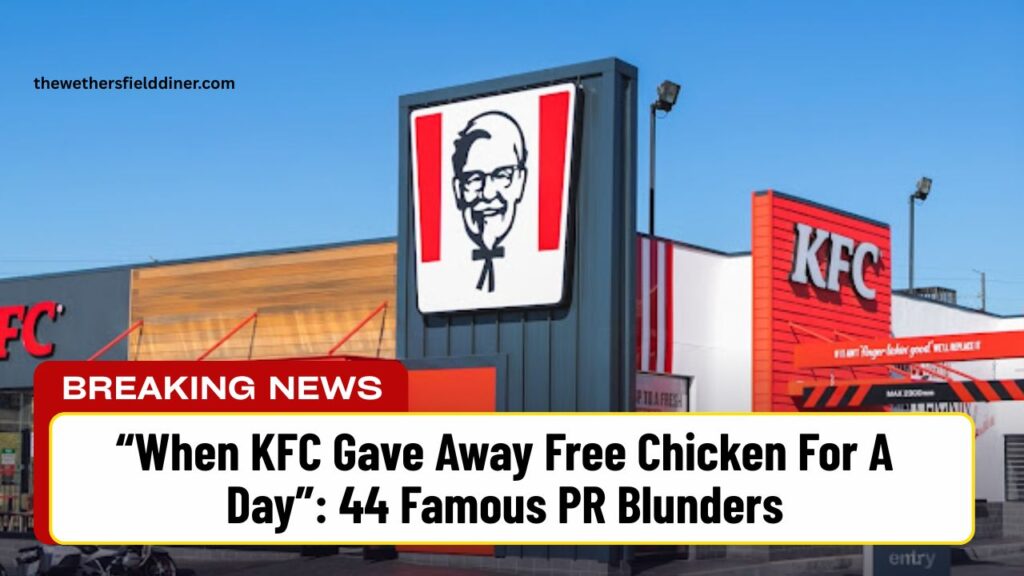For a company to stand out, it often has to make bold choices. Memorable products and eye-catching advertisements are key to catching the public’s attention. However, anyone who claims that “all publicity is good publicity” has clearly never experienced a full-scale PR disaster.
Sometimes, these mistakes are amusing. Other times, they lead to lawsuits, boycotts, or even the complete downfall of a business. Reddit users have recalled some of the worst PR blunders of all time, and we’ve compiled the most unforgettable examples for you.
From offensive slogans to marketing campaigns gone wrong, these stories prove why careful planning is essential.
Social Media Campaigns Gone Wrong
Nestlé’s #AskNestle Fail
In Germany, Nestlé launched a Twitter Q&A campaign using the hashtag #AskNestle. Instead of friendly brand questions, they were flooded with angry messages such as:
- “Why are you letting children starve?”
- “Why do you support child labor?”
- “Why do you hate the rainforest?”
The backlash was so intense that the campaign quickly collapsed.
#YourTaxis in Australia
To fight Uber’s growing dominance, Australia’s taxi industry launched #YourTaxis, encouraging customers to share great taxi experiences. Instead, people flooded the hashtag with horror stories, turning a PR campaign into a public roast.
We Are All Leo Messi
When soccer star Lionel Messi was found guilty of tax fraud, his club F.C. Barcelona launched a campaign saying “We Are All Leo Messi”. Many fans were outraged—pointing out they didn’t make $22.6 million a year and could, in fact, pay their taxes.
Advertising Misfires That Went Viral
Burger King’s Google Disaster
Burger King aired a short ad saying, “OK Google, what is the Whopper burger?”. This triggered nearby Google Home devices to read Wikipedia’s Whopper page. People quickly edited the page to say the burger contained children or traces of cyanide. Google eventually blocked the ad from working.
Pepsi’s Slogan Translation in Taiwan
Pepsi’s slogan “Come Alive with the Pepsi Generation” was mistranslated in Taiwan as “Pepsi will bring your ancestors back from the dead”. Needless to say, it caused confusion rather than sales.
McDonald’s Weather-Dependent Campaign
In the UK, Mars Ice Cream created a summer promotion triggered by 21°C temperatures. Unfortunately, it rained all summer, and the campaign never launched. The lesson? Never rely on British weather.
Disasters in Event Planning
Balloonfest ‘86
United Way of America attempted to break the record for largest balloon release with 1.5 million balloons. They forgot one thing—balloons come back down. The stunt caused property damage, disrupted air travel, killed wildlife, and even contributed to two deaths. Lawsuits followed.
KFC’s Oprah Giveaway
KFC offered free chicken meals for one day and advertised it on The Oprah Winfrey Show. Millions showed up, overwhelming stores, and KFC had to apologize after running out of food.
When Hashtags Go Horribly Wrong
Susan Boyle’s Album Party
Susan Boyle’s PR team promoted her album release with the hashtag #susanalbumparty. Without proper capitalization, it went viral for all the wrong reasons.
Pretzel Shop’s Fake Parking Tickets
A Philadelphia pretzel shop handed out flyers designed to look like parking tickets. Residents, already stressed about limited parking, were furious when they found it was just an ad.
Corporate Arrogance and Public Backlash
Gerald Ratner’s Infamous Speech
In 1991, jeweler Gerald Ratner mocked his own products, calling them “total crap” and joking that cheap earrings were of lower quality than a prawn sandwich. Customers abandoned his stores, nearly destroying the company.
Dieseltec’s Anti-LGBT Stunt
A Michigan repair shop announced they would not serve gay customers. Internet backlash uncovered that the business was unlicensed, linked to a sex offender, and had legal issues. The business collapsed.
When Celebrity Endorsements Backfire
Wyclef Jean’s AMA Disaster
Rapper Wyclef Jean hosted a Reddit AMA to promote an album but faced backlash over allegations of charity fund mismanagement. He deleted his account mid-session.
Pittsburgh Penguins’ James Neal Q&A
The hockey team invited fans to ask player James Neal questions on Twitter. Given Neal’s dirty play reputation, the questions were sarcastic and brutal, turning the event into a roast.
Product Giveaways That Went Out of Control
Nestea’s Endless Free 12-Pack
Nestea placed free product coupons inside 12-packs, but customers discovered they could keep exchanging packs indefinitely. Stores were wiped out within hours.
Pepsi’s Philippines Contest
In 1993, Pepsi promised 1 million pesos to anyone with a bottle cap showing “349.” They accidentally printed 800,000 winning caps, leading to riots and death threats against executives.
Other Notable PR Disasters
- Apple’s U2 Album Giveaway – Forcing a U2 album onto every iTunes account without consent.
- Starbucks’ Race Together – Asking baristas to talk about race with customers, which many found uncomfortable.
- Burnout Game’s Speeding Ticket Offer – Promising to pay players’ speeding tickets angered law enforcement.
These PR disasters prove that no matter how big the company, poor planning, cultural misunderstandings, or arrogance can destroy a marketing campaign.
While some mistakes are funny in hindsight, others caused serious damage to reputations, finances, and public trust.
The lesson? Test your campaigns, research your audience, and think twice before hitting “launch.”
Frequently Asked Questions
1. What is a PR disaster?
A PR disaster is a situation where a company’s actions or marketing create negative public attention, damaging its reputation.
2. Can bad publicity ever be good?
Rarely. While controversy can create attention, long-term trust is often lost, leading to lower sales and brand damage.
3. How can companies avoid PR blunders?
By testing campaigns, understanding cultural nuances, and preparing crisis management plans before launching any public initiative.
